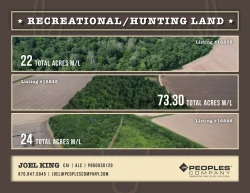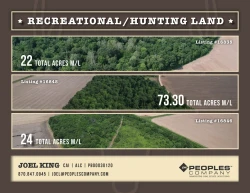The Delta region is comprised of Arkansas, Mississippi, and Louisiana. The region’s agricultural outputs include rice, soybeans, corn, sugarcane, cotton, grain sorghum, and peanuts on the grain side, and over 1.6 billion chicken broilers per year. Farmland productivity levels and values generally lie on a gradient from the Mississippi River with higher values the nearer the river. The region has good to excess rainfall, and groundwater resources that are well-suited for irrigation. However, the Delta does suffer from higher weather risks, including periods of excessive heat and catastrophic excessive rainfall events that result in flooding and soil erosion. Access to the river transportation system results in a much stronger basis than in areas where transportation costs to final markets are higher, though recent low-water events have strained that channel to export markets as well.
With annual production valued at about $20 billion, Arkansas agriculture represents the largest single industry, according to the Arkansas Department of Agriculture. Operating approximately 42,000 farms across 14 million acres, Arkansas is the top producer in the region. The state ranks first in U.S. rice production, producing nearly 50% of the nation’s rice at a value close to $1.4 billion with well over half exported. Agriculture in Mississippi is a $9 billion industry, employing over 17% of the state’s workforce, according to the Mississippi Department of Agriculture & Commerce. There are approximately 35,000 farms in the state covering 10.4 million acres (for context, there are also 19.2 million acres of forest land in the state). The Big-4 outputs are corn ($630 million), cotton ($625 million), cattle/calves ($318 million) and catfish ($260 million). Louisiana is a large poultry grower with sales of roughly $2 billion, and the second largest sugarcane producer in the U.S. behind Florida, with annual production worth nearly $1.2 billion. The state’s other top commodities include soybeans ($712 million), cattle ($465 million), rice ($506 million) with aquaculture and feed grains each adding about $500 million.
The Delta is also well known for being the home of Walmart - the largest food retailer in the world, Tyson Foods - the largest poultry and meat processor in the nation, and Riceland Foods - America’s largest rice exporter.
Access to these off-takers and market makers allows integrated livestock and agricultural operations to thrive in the Delta. The Delta also tends to have larger farmland tracts and highly productive soils, with a very visible focus of institutional owners. Agriculture in the Delta was described as being “less democratized” in the sense that there are fewer bidders and sellers for farmland, larger tracts, less developed systems of farm managers around tenant networks, and an evolving identity pursuing larger scale, highly efficient commercial farms while still having a reasonable number of local smaller scale farms. While agriculture in the region has traditionally focused on row crops, but there is a growing effort to attract large-scale vegetable operations and develop the infrastructure associated with vegetable and small-format fruit production, bringing competition to other areas in the U.S. that are facing higher pressures from population growth and water scarcity. Transactional volumes in 2023 slowed to a crawl, but values held or even increased. Anecdotally, more of the sales moved “off market” with a few institutional fund transactions nearing end of life. And, considerable attention is being paid to foreign ownership issues with state-mandated study bills, and legislative considerations of additional restrictions on ownership and use. Development of solar and wind resources in the region has also begun to increase, but not to the point of meaningfully affecting production acreages.
Annual price appreciation and annual income features of the region are comparable if not a bit tame compared to other row-crop production regions, with it noted that the Delta performs much like a throttled version of the Corn Belt, with similar but slower and somewhat more muted reactions to major market forces. The volatility in returns has also been fairly mild and annual cash returns are highly predictable.
SUMMARY
The Delta faces its own unique challenges, but lower land costs, plentiful water, larger parcel size, and the opportunity to enhance profitability more sophisticated farming methods have attracted – and will continue to attract – the attention of investors in the region. The longer-term return performance is highly competitive even if the transactional market volume has been challengingly low in terms of making acquisitions and getting exposure at scale to the region’s agriculture.
ALL REGIONS





